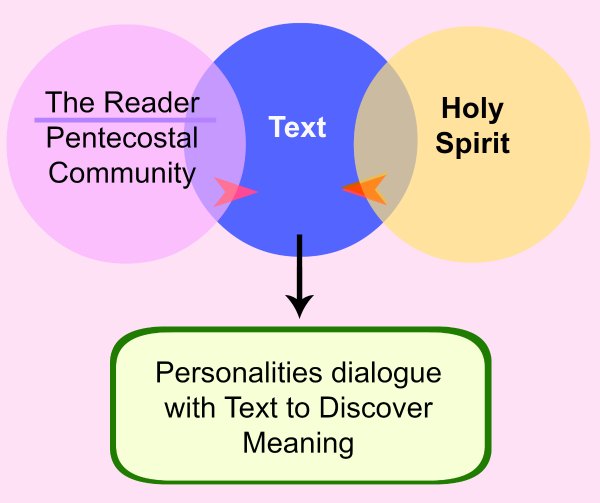Pentecostal Hermeneutics: Approach and Methodology
Personal Observations and Conclusion
I agree with Randolph Tate[28] when he affirms: “just as the author brings his or her worldview and understanding of reality to a text, allowing the text to mirror at least some elements of that worldview and reality, so the reader brings to the text his or her worldview and conception of reality.”[29] Reading the Bible should not be a monological process (a process by which the text alone speaks to the reader), but a dialogical one (a process in which the text and the reader engage in an ongoing dialogue). The reader should discover himself in the text, giving away his human failures and receiving divine direction from the text. Asking questions from the text and allowing the text to ask him questions. This is a concept that Pentecostalism has captured well. Pentecostals bring their experiences and challenges to the scripture, and then allow these experiences to dialogue with the text in the presence of the Holy Spirit. They believe that the same Spirit that guided in the writing of the scripture is the same Spirit present in their lives and thus he guides them in understanding the same scriptures he helped write, and helps them apply the same in their lives. To me, this is the best way of appropriating praxis as a crucial part of hermeneutical procedure. The Pentecostal community looks at the Bible to locate their life story and find answers to their life challenges.
Pentecostals read scriptures within a community. The individual Bible reader does not approach it with an independent mind but with a mind guided by the common beliefs of the larger community. The reader and the Holy Spirit meet at the text and engage in a dialogue. Central to Pentecostal theology is the idea that salvation entails a relationship between the human being and God. There is no better place for this relationship to be enhanced than in the scriptures. The following figure demonstrates the Pentecostal hermeneutical process.

In such an approach to biblical interpretation, God in the person of the Holy Spirit plays his role as a teacher or counselor in aiding the individual Christian to understand the word of God. The Holy Spirit, being the author of the text, is the best person to aid in the interpretation of the same text. There is no better way to understand a message than to hear it from the original author. Thus the reliance on the Holy Spirit to interpret the scriptures as practiced by Pentecostals, in my view, is highly commendable. Therefore, I believe a hermeneutical circle that involves the Spirit, the Text, and the individual Bible reader is a strong approach to biblical interpretation.


